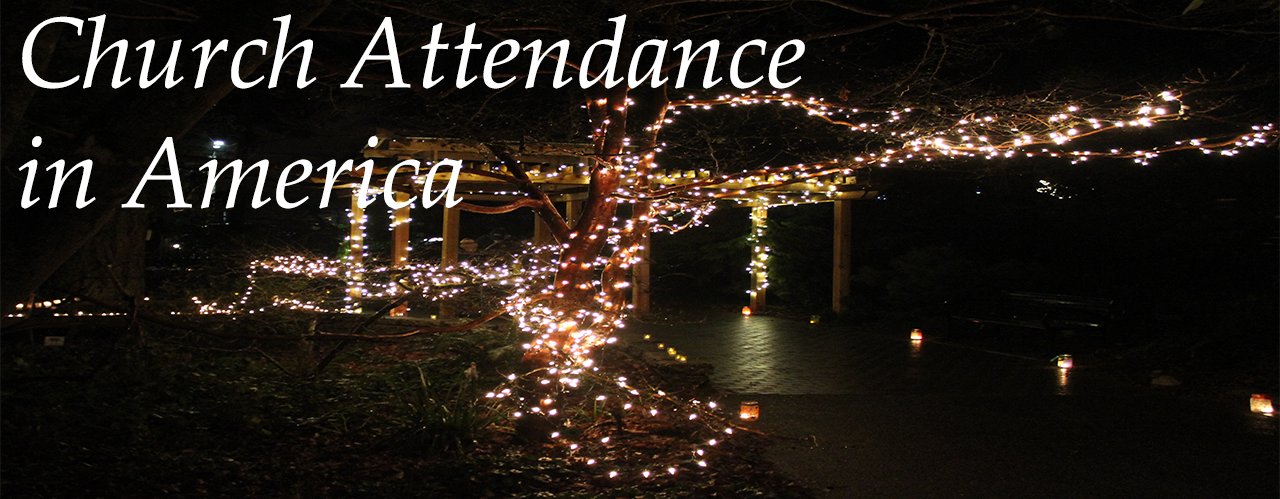by Rebecca Barnes and Lindy Lowry, Outreach writer for churchleaders.com (Kelly Shattuck)
1. Less than 20% of Americans regularly attend church — half of what the pollsters report.
While Gallup polls and other statisticians have turned in the same percentage — about 40% of the population — of average weekend church attendees for the past 70 years, a different sort of research paints quite a disparate picture of how many Americans attend a local church on any given Sunday.
Initially prompted to discover how church plants in America were really doing, Olson, director of church planting for the Evangelical Covenant Church (covchurch.org), began collecting data in the late “80s, gradually expanding his research to encompass overall attendance trends in the Church. In his study, he tracked the annual attendance of more than 200,000 individual Orthodox Christian churches (the accepted U.S. church universe is 330,000). To determine attendance at the remaining 100,000-plus Orthodox Christian churches, he used statistical models, which included multiplying a church”s membership number by the denomination”s membership-to-attendance ratio.
The Numbers
His findings reveal that the actual rate of church attendance from head counts is less than half of the 40% the pollsters report. Numbers from actual counts of people in Orthodox Christian churches (Catholic, mainline and evangelical) show that in 2004, 17.7% of the population attended a Christian church on any given weekend.
Another study published in 2005 in The Journal for the Scientific Study of Religion by sociologists C. Kirk Hadaway and Penny Long Marler — known for their scholarly research on the Church — backs up his findings. Their report reveals that the actual number of people worshipping each week is closer to Olson”s 17.7% figure — 52 million people instead of the pollster-reported 132 million (40%).
“We knew that over the past 30 to 40 years, denominations had increasingly reported a decline in their numbers,” Marler says. “Even a still-growing denomination like the Southern Baptist Convention had reported slowed growth. Most of the mainline denominations were all reporting a net loss over the past 30 years. And at the same time, the Gallup polls had remained stable. It didn”t make sense.”
The Halo Effect
What Hadaway and Marler, along with Mark Chaves, author of the “National Congregations Study,” discovered was at play is what researchers call “the halo effect” — the difference between what people tell pollsters and what people actually do. Americans tend to over-report socially desirable behavior like voting and attending church and under-report socially undesirable behavior like drinking.
Gallup Poll Editor in Chief Frank Newport agrees that the halo effect factors in to poll results. During a Gallup telephone survey of a random sampling of about 1,000 Americans nationwide, interviewers ask respondents questions such as, “In the last seven days, did you attend a church service, excluding weddings and funerals?” to determine their church-going habits.
“When people try to reconstruct their own behavior, particularly more frequently occurring on-and-off behavior, it is more difficult, especially in a telephone interview scenario,” Newport says. But he stands behind Gallup”s 40% figure: “I”ve been reviewing [U.S. church attendance] carefully,” he says. “No matter how we ask the question to people, we get roughly 40% of Americans who present themselves as regular church attendees.” He adds, however, that if you were to freeze the United States on any Sunday morning, you may find fewer than 40% of the country”s adults actually in churches.
“Although about 40% of Americans are regular church attendees, it doesn”t necessarily mean 40% are in church on any given Sunday,” he explains. “The most regular church attendee gets sick or sleeps in. The other reason may be people who tell us they go to church but are worshipping in non-traditional ways, such as small groups, people meeting in gyms or school libraries.”
A Disconnect
In another study surveying the growth of U.S. Protestants, Marler and Hadaway discovered that while the majority of people they interviewed don”t belong to a local church, they still identify with their church roots. “Never mind the fact that they attend church less than 12 times a year,” Marler observes. “We estimate that 78 million Protestants are in that place. Ask most pastors what percentage of inactive members they have — they”ll say anything from 40–60%.”
Even with a broader definition of church attendance, classifying a regular attendee as someone who shows up at least three out of every eight Sundays, only 23–25% of Americans would fit this category. Olson notes that an additional million church attendees would increase the percentage from 17.7% to only 18%. “You”d have to find 80 million more people that churches forgot to count to get to 40%.”
Clearly, a disconnect between what Americans say and what they actually do has created a sense of a resilient church culture when, in fact, it may not exist.
2. American church attendance is steadily declining.
In 1990, 20.4% of the population attended an Orthodox Christian church on any given weekend. In 2000, that percentage dropped to 18.7% and to 17.7% by 2004. Olson explains that while church attendance numbers have stayed about the same from 1990 to 2004, the U.S. population has grown by 18.1% — more than 48 million people. “So even though the number of attendees is the same, our churches are not keeping up with population growth,” he says.
Well-known church researcher and author Thom Rainer notes that the failure of churches to keep up with the population growth is one of the Church”s greatest issues heading into the future. In a 2002 survey of 1,159 U.S. churches, Rainer”s research team found that only 6% of the churches were growing — he defines growth as not only increasing in attendance, but also increasing at a pace faster than its community”s population growth rate. “Stated inversely, 94% of our churches are losing ground in the communities they serve,” he says.
Denominational Differences
A breakdown of overall attendance percentages by church type shows decreases across the board in evangelical, mainline and Catholic churches.
The most significant drop in attendance came at the expense of the Catholic Church, which experienced an 11% decrease in its attendance percentage from 2000 to 2004. Next, and not far behind were mainline churches, which saw a 10% percentage decline. Evangelicals experienced the smallest drop at 1%.
Though scholars are hesitant to definitively acknowledge a decline, they do say that attendance is not increasing: “There”s no good evidence to suggest that overall church attendance has gone up in the recent decade,” Chaves says, adding that he believes there has been a decline. He cites the watershed book Bowling Alone (Simon and Schuster) by Harvard sociologist Robert D. Putnam as his primary reasoning.
“I think church attendance is a close cousin to the other kinds of activities Putnam says Americans are doing alone — indicating that Americans have become increasingly disconnected from family and friends,” Chaves says. “So if all those areas are going down and church attendance isn”t, that would be odd.”
He identifies various implications declining attendance may have for church leaders: “If this is the reality, then I see a trend toward people being less involved, while maintaining a connection to the church. Maybe a pastor used to be able to count on seeing someone every week, but what”s now happening is that people”s lives are busier and they”re attending more infrequently. So church leaders can”t count on these same people to teach Sunday school, serve on committees, etc.”
Contradictory Research
Recent data from The Barna Group (barna.org) indicates just the opposite. Church attendance is actually growing, company President George Barna says — climbing slowly from 1996″s 37% to 47% in 2006. His research shows that other core religious behaviors are also up.
For example, Bible reading increased from 40% in 2000 to 47% in 2006.
“The data shows the number of unchurched people is unchanged — 76 million adults,” he says. “And 47% of Americans reported to us that in the last seven days, they attended a church service, excluding weddings and funerals.” His research indicates that attendance at house churches has also spiked. That may explain, Barna says, why these core religious behaviors are up. “Nevertheless, people are seeking God.”
Ed Stetzer, missiologist and director of the Center for Missional Research at the North American Mission Board (namb.net) of the Southern Baptist Convention, has found similar evidence of spiritual behavior occurring outside church walls. He recently finished a study on alternative faith communities, and found that a growing number of people are finding Christian discipleship and community in places other than their local churches. The study found that 24.5% of Americans now say their primary form of spiritual nourishment is meeting with a small group of 20 or less people every week.
“About 6 million people meet weekly with a small group and never or rarely go to church,” Stetzer says. “There is a significant movement happening.”
3. Only one state is outpacing its population growth.
Hawaii, where 13.8% of the state”s population (1.3 million) regularly attends church, was the only state where church attendance grew faster than its population growth from 2000 to 2004. However, church attendance in Arkansas, Oklahoma, South Carolina and Tennessee — all of which have higher percentages of church attendees than Hawaii — was close to keeping up with population growth in the respective states (see U.S. map on page 50).
In Hawaii, 6.3% of the population attended an evangelical church in 2004; mainline denominations accounted for 1.8%; and 5.7% regularly worshipped in Catholic congregations.
A few states break from regional attendance trends. Texas — in the middle of the Bible Belt and home to more than 17 of the country”s largest churches — saw only 18% of its population (22.5 million) attend church on any given weekend in 2004, compared to sur-rounding states Oklahoma (22%), Louisiana (28%) and Arkansas (25%). And Florida (14.1%) had the lowest percentage of the Southern region (averaging 23%). Both Texas and Florida saw population growth (2000 to 2004) that was twice the national average.
Olson notes that states with very diverse cultures tend to have lower attendance numbers than the states surrounding them. “Most of our churches know how to address only one culture,” he says.
A closer look at the states only found more decline between 1990 and 2000. Church attendance declined in more than two-thirds of all U.S. counties: Slightly more than 2,300 counties declined, and 795 increased.
4. Mid-sized churches are shrinking; the smallest and largest churches are growing.
While America”s churches as a whole did not keep up with population growth from 1994 to 2004, the country”s smallest (attendance 1–49) and largest churches (2,000-plus) did (see graph on page 52). During that period, the smallest churches grew 16.4%; the largest grew 21.5%, exceeding the national population growth of 12.2%. But mid-sized churches (100–299) — the average size of a Protestant church in America is 124 — declined 1%. What were the reasons for the decline?
“The best way I can describe it is that a lot of people believe they”re upgrading to first class when they go to a larger church,” Olson says. “It seems highly likely that some of the people in those mid-sized churches are the ones leaving and going to the larger churches.”
Stetzer agrees and adds that because today”s large churches emphasize small groups and community, hoping to create a small-church feel, they offer the best of both worlds.
“There are multiple expectations on mid-sized churches that they can”t meet — programs, dynamic music, quality youth ministries,” he says.
“We”ve created a church consumer culture.”
As president of the Bridgeleader Network, David Anderson, senior pastor and founder of Bridgeway Community Church in Columbia, Md., has consulted with church leaders nationwide. In his work, he has observed that mid-sized congregations tend to lose the evangelistic focus they once had, and instead adopt what he calls a “club mentality.”
“You have just enough people not to be missional anymore,” he explains. “You don”t have to grow anymore to sustain your budget.”
As for why the smallest churches have kept up, Shawn McMullen, author of the newly released Unleashing the Potential of the Smaller Church (Standard), notes that smaller churches cultivate an intimacy not easily found in larger churches. “In an age when human interaction is being supplanted by modern technology, many younger families are looking for a church that offers community, closeness and intergenerational relationships,” he says.
Olson points out that for a church of 50 or less, the only place to go is up. “They have a relatively small downside and a big upside. A church of 25 can”t decline by 24 and still be on the radar. But it can grow by 200.”
5. Established churches — 40 to 190 years old — are, on average, declining.
All churches started between 1810 and 1960 (excluding the 1920s) declined in attendance from 2003 to 2004. The greatest attendance decrease in that period (-1.6%) came from churches begun in the 1820s, followed by the 1940s (-1.5%).
The numbers climb to the plus side in the 1970s, with churches between 30 and 40 years old showing a slight .3% increase. The percentage goes up significantly for congregations launched in the 1980s (1.7%) and 1990s (3%).
Established churches in decline are suffering from a leadership crisis, says Kirbyjon Caldwell, senior pastor of Windsor Village United Methodist Church in Houston. While his church is 50 years old, Caldwell says he has been there 25 years and in effect has made a “DNA change.” The church has grown from a struggling congregation of 25 to 7,100 under his charge.
Reversing the decline, he says, was about the leaders of the church — both clergy and laity — deciding to redefine the congregation and meet the needs of the community.
Bob Coy, senior pastor and founder of Calvary Chapel Fort Lauderdale, points to a different crisis for established churches — one of relevancy, especially in light of today”s young people searching for real truth and reasons for actions. “The emptiness of yesterday”s liturgy has got to become relevant,” Coy says. “The next generation is screaming for a relationship with God.”
The declining numbers send a message to church leaders content with only building their own churches, Olson says: “I hear people say, ‘Why do we need new churches? Why don”t we help our established churches do better?” or ‘Don”t we have enough churches?” If we keep doing the same things, we”ll continue to have the same results — decline. Established churches are the base, and new churches build on top of that. Using established churches to keep up with population growth is just not going to work.”
6. The increase in churches is only 1/4 of what”s needed to keep up with population growth.
Between 2000 and 2004, the net gain (the number of new churches minus the closed churches) in the number of evangelical churches was 5,452, but mainline and Catholic churches closed more than they started for a net loss of 2,200, leaving an overall net gain of 3,252 for all Orthodox Christian churches. “In this decade, approximately 3,000 churches closed every year; while more churches were started, only 3,800 survived,” Olson explains. In the 21st century, the net gain in churches has amounted to only 800 each year.
10,000 more churches needed
Perhaps most telling is the fact that from 2000 to 2004, a net gain of 13,024 churches was necessary to keep up with the U.S. population growth. In reality, that means rather than growing with the population, the Church incurred a deficit of almost 10,000 churches.
The gap is a serious one for Christianity in America, as research and studies show that church plants are the most effective means of evangelism and church growth. “More evangelism happens through church planting than megachurches,” Anderson says. He urges leaders to plant multicultural, missional churches.
Although ultimately, America will continue to see a great dying off of churches, Stetzer says he is encouraged to see a renewed interest in missiology and Christology, as well as churches that are striving to change themselves. “They”re asking what a biblical church would look like,” he says. But he advises church planters to customize their church to their community rather than copy an existing model.
“What”s going to make an effective church plant in their community depends on what their community looks like,” he explains. “Far too many pastors plant their church in their heads and not in their community.”
Olson encourages churches, regardless of their size or expansion strategy, to either plant a church or work with other congregations to plant a church every five years.
Many church plants of the last five years are intentionally smaller than those of the 1990s, he observes, because the younger generation is opting for smaller churches that offer a more intimate experience. “So we need to realize that if churches are going to be smaller, we”ll need to start more of them to have the same impact.”
7. In 2050, the percentage of the U.S. population attending church will be almost half of what it was in 1990.
So what is the future of the American Church? Does declining attendance mean declining influence? If present trends continue, the percentage of the population that attends church in 2050 is estimated to be at almost half of 1990″s attendance — a drop from 20.4% to 11.7%. Olson”s projections for the years leading up to 2050 are less than encouraging. He estimates a drop to 16.6% in 2010, and 15.4% in 2020.
He notes that while church attendance is projected to increase from 50 million in 1990 to 60 million in 2050, because the U.S. Census estimates that America will grow from 248 million in 1990 to 520 million in 2050, the Church can”t keep up with population growth if it stays on its current course.
The prognosis doesn”t discourage Anderson. “It encourages me that the harvest is greater,” he says. “I”m somewhat comforted by the idea that Americans have left dead churches.”
Caldwell echoes Anderson”s positive outlook: “If anything, this information causes me to get fired up about what I can do to reverse these trends.”
Coy, too, sees the projections as a call to action for church leaders: “If we”ve given the impression that church is an option, maybe we”re the ones who are at fault,” he says. But church attendance is only the beginning, he adds. “We have to get serious and begin to live it every day.”
Clearly, the future looks less than bright for the Church in America; nevertheless, countless stories of transformed lives remind us that God is using, and wants to continue to use, the 330,000 U.S. Orthodox Christian congregations to draw others to Him and strengthen believers for His work in a hurting world. In the words of the late author Henri Nouwen, the Church maintains the vital connection to Christ:
“Listen to the Church,” he writes in Show Me the Way (Crossroad). “I know that isn”t a popular bit of advice at a time and in a country where the church is frequently seen more as an ‘obstacle” in the way rather than as the ‘way” to Jesus. Nevertheless, I”m profoundly convinced that the greatest spiritual danger for our times is the separation of Jesus from the Church. The Church is the body of the Lord. Without Jesus, there can be no Church; and without the Church, we cannot stay united with Jesus. I”ve yet to meet anyone who has come closer to Jesus by forsaking the Church. To listen to the Church is to listen to the Lord of the Church.”















